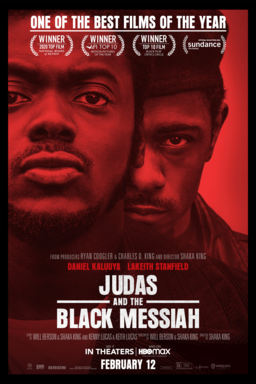“Judas and the Black Messiah” calls for justice

Official movie poster for “Judas and the Black Messiah”
Inspired by the true story of Fred Hampton, a chairman of the Illinois Black Panther Party, “Judas and the Black Messiah” might just be one of my favorite Black History films to date. Daniel Kaluuya and Lakeith Stanfield’s performances in the film truly showcased just how talented they truly are. If you have not already seen the movie, I highly recommend it. Although this film made me happy to learn some of the history of Fred Hampton, it also saddened me to realize that people of color are still fighting for equal rights and justice.
In one scene in the film, Former FBI Director J. Edgar Hoover, portrayed by Martin Sheen, made a statement about the perceived danger of the Black Panther Party: “The Black Panthers are the single greatest threat to our national security. More than the Chinese. Even more than the Russians. Our counter-intelligence program must prevent the rise of a Black Messiah from among their midst. One with a potential to unite the Communist, the anti-war, and the New Left movements.”
Why was the Black Panther Party such a threat to U.S. national security?
The Black Panther Party was originally known as the Black Panther Party for Self-Defense, and was founded in 1966 in Oakland, California by Huey P. Newton and Bobby Seale. The revolutionary party was a part of the Black Power Movement, and its original purpose was to protect African American neighborhoods and protect African Americans from police brutality—something that we are still fighting against in today’s political climate, as seen through the formation of the Black Lives Matter Movement.
“The Panthers eventually developed into a Marxist revolutionary group that called for the arming of all African-Americans, the exemption of African-Americans from the draft and from all sanctions of so-called white America, the release of all African Americans from jail, and the payment of compensation to African Americans for centuries of exploitation by white Americans,” wrote Garrett Albert Duncan in his Britannica article “Black Panther Party.”
The Black Panther Party also sought to help those in need. “Judas and the Black Messiah” did an awesome job of portraying some of the armed Black Panther members, and they even mentioned the party’s community projects such as the Free Children’s Breakfast for program and a free clinic.
“If you read the FBI files you will see that even Mr. J. Edgar Hoover himself had to say that it was not the guns that were the greatest threat to the internal security of the United States of America; it was not the guns, it was the Free Children’s Breakfast Program that was the greatest threat to the internal security of the United States of America…” said Rodger in Spike Lee’s “A Huey P. Newton Project.”
“ …the Free Children’s Breakfast Program engendered a certain following on the Black community’s part, a certain respect on the Black community’s part,” Rodger continued. “I mean, nobody can argue with free grits. So, Hoover saw it as a… kind of… infiltration.”
What is so great about the film is the acting was so spot on. You can clearly see that J. Edgar Hoover felt as though the Black Panther Party, or as Hoover called them, the Black Identity Extremists, were a threat. They sought out to destroy the group by any means necessary, even if that meant locking poor Hampton, the film’s protagonist, up for ice cream and eventually killing him in his apartment.
Hampton’s son never got a chance to know his father; he was brutally murdered and yet his murderers got away with it because they were law enforcement. In today’s political climate, African-Americans see this happening much more than we should. How is it that we are still considered such a threat when we are American citizens? We were born here, we work and pay our taxes, we served in wars to protect this country and yet there’s no protection for us? Watching this amazing film showed me some of the history of African-Americans’ fight for equal rights and justice, and also made me realize that we are still in this fight for a better, more united future to come.










